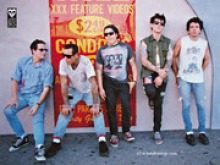Peters first came to the attention of skateboarders in Southern California as one of the early, noteworthy pool enthusiasts during the 1970s. He then went on to play in a number of bands throughout the ‘80s, and later with the Exploding Fuck Dolls. In the mid-‘90s he formed the U.S. Bombs.
A year or so after Live at the Mesa Club, the band released Garabaldi Guard, and was soon offered a spot as the house band on Comedy Central’s Premium Blend. The cultural shock that the quintet delivered with its music, as well as its habit of occasionally making noise and bumping into things during the performance, only served to solidify the fact that they shouldn’t really be there.
Growing up, it seemed, was the furthest thing from the band’s collective mind. But it was during these heady days of lucrative, yet ridiculous televised exposure, that Peters met the colossal former Nashville Pussy bassist, Corey Parks and, in addition to forming another band, the Hunns, with her on bass, became a father of Clash Peters. If partnerhood and parenthood changed Peters, the expansive catalogue he created during this time, from roughly ’00 to ’06, didn’t reveal it. The musician that created the U.S. Bombs remained committed to playing junky punk, or, as the band calls it, “war music.” Peters’ approach to music had become codified. Since and even prior to this, his music had been criticized for playing on teenage fantasies of ‘70s punks and never moving beyond that—perhaps a fair viewpoint, but you have to respect the guy for maintaining a musical pallet.
Punkers do grow up. Some get jobs, some get messed up and some figure out the formula to remain vibrant enough to clasp music as a lifelong endeavor. Social Distortion’s Mike Ness has achieved that. So too has Rancid’s Tim Armstrong. But Ness seems to have cooled out and while Armstrong doesn’t necessarily seem to have aged, his priorities are now split with running a label that continues to prove a financial success. Peters really has no such luxuries, and, in that sense, the forty-something might be in possession of one of the last true voices of SoCal’s punk movement. To hear that voice, moaning along to the fuzzy tones of a band that could have easily fathered most of the audience is to experience the visceral and emotional content of punk as a philosophy, a movement and a music.
